
|
an ongoing series by Thomas E. Kennedy and Walter Cummins
 photo by Alice M. Guldbrandsen |
Moored at Stockholm:
The Lamentations of Barbara Hutton
Essay and Photos by Walter Cummins
The contrast was startling. That morning we had left a spacious six-room apartment in Copenhagen and, after a short flight, mid afternoon unlocked the door to a tiny cabin in a yacht hotel – the Malardrottningen – anchored off Riddarholmen Island, one of the many that make up the city of Stockholm. The bunks far too narrow for a couple, Alison – much more agile than I – volunteered to take the top, and because we couldn't find a ladder, tested it by climbing onto the desk and pulling herself up. Stretched out, she
Of course, if we had been staying on that yacht many decades ago, when it was a plaything of heiress Barbara Hutton, those 60 hotel cabins would have been just seven suites, overwhelming us with space. But then there's no chance we ever would have been invited as guests in the Hutton social circle. So bunking in the Malardrottningen to enjoy Stockholm was the best we could have hoped for and, in many ways, beyond our expectations.
found her nose just inches from the metal ceiling, relieved not to suffer claustrophobia.
A woman at the desk did fetch us a ladder, and it wasn't for several days that we discovered another, slid under the lower bunk, mine. Now we had two. For a few hours one afternoon, our toilet – along with all the others on the ship – stopped functioning. But otherwise it was a perfectly serviceable room if you spent most of your time away exploring the city. In fact, it served as an incentive to be out and about, and we're thankful for that.
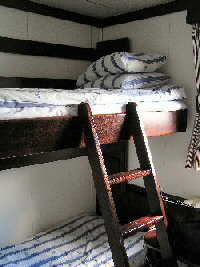
Upper berth
The small island offered a wide esplanade at the water's edge, the metal tables around a kiosk that served food and drink, and several important structures –17th century palaces, a church where kings and royals are buried, the Swedish supreme court, and an ancient tower, along with a statue of Birger Jarl, the city's 13th century founder.
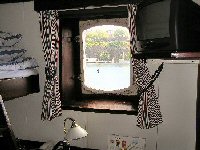
Porthole view
Despite its limited dimensions, the cabin offered certain charms, mainly the view out the porthole of an expanse of rippling water, granite cliffs, handsome buildings, and, if you craned your neck, the famous Stockholm City Hall off to the right. Being able to walk down a gangplank onto Riddarholmen also satisfied.

Riddarholmen
A short walk on the island's cobblestones and across a bridge over a highway led to Gamla Stan, the old city, the original island of Stockholm's birth, site of the Royal Palace, the Nobel Museum, structures that go back to the 1200s, a network of charming narrow streets and alleys, endless souvenir shops, and thousands of tourists wandering up and down, we among them. Each night after an alfresco dinner, we had the luxury of leaving the bustle to return to the quiet of Riddarholmen and the Malardrottningen, where the only sound was the water lapping against the ship.
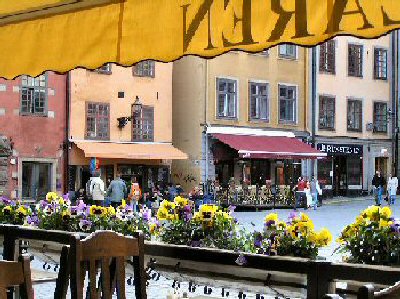
Gamla Stan
As far as I know, Barbara Hutton never got to Stockholm on her yacht or anyone else's, never enjoyed this beautiful city of fourteen islands. She seemed to gravitate toward places that offered abundant sun and warmth, like Venice and Marrakech. And she probably wouldn't have liked Sweden. We know she hated Denmark, a country further south. One of her many husbands, Count Haugwitz-Reventlow, father of Lance, her only child, was a Danish aristocrat with an ancestral home. According to C. David Heymann, author of Poor Little Rich Girl, “she detested the stark, lonely island of Lolland with its one small village of Saxkobing and its damp and misty climate.”
But the owners of the Malardrottningen flaunt its connection with Hutton, naming the ship after her and displaying her photo in public places like the TV lounge and the breakfast dining area, a large portrait on a wall next to the set broadcasting perpetual CNN, pictures of her with several husbands – Cary Grant, Porfirio Rubirosa,
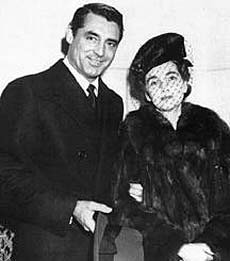 Cary Grant and Barbara Hutton |
Reventlow – one of her beside the count holding her infant son, later a spoiled young man who wrecked sports cars until he was killed in a plane crash at 36, deepening his mother's decline into decadence. But that came later. In these photos, Barbara posed amidst elegance, arm in arm with a handsome man, trying to look happy. A thin, almost gaunt woman, she never pulls it off, even when smiling, though that impression may be biased by what we know about her life. |
For all her poems, reading, and playing hostess to famous writers, Hutton, at best, hovers on the fringe of a literature, more the subject of gossip columns and potboilers, including a bio-epic movie. In this sense, she fills the role of an archetype, the woman who has more than every material possession, yet leads a life of failure and misery -- Christina Onassis. Princess Stephanie, Doris Duke, Barbara's acquaintance and doppelganger. Today Hutton might have followed the Paris Hilton path, blatant for the masses rather than attempting to inflate great wealth with aristocratic pretensions.
Still in her teens, she owned a 26-room Fifth Avenue duplex, putting our Copenhagen apartment to shame and making our Malardrottningen cabin feel even more cramped. Yet, ironically, for all the space she possessed, including this yacht, she lived confined in a psychic prison. Having everything, she had nothing, desperate in her seeking – her sexual predations, her marriages and affairs, her jewels, her ostentation, her dissipation.
Her debut, according to Heymann, was celebrated in three stages: first, 500 guests at the Fifth Avenue triplex of her uncle Edward and Marjorie Hutton; second, another 500 dining and dancing at Central Park Casino; third, a ball for 1000 at Ritz-Carlton at a cost of $60,000 (when that meant real money) for four orchestras, 200 waiters, 2000 bottles of champagne, 10,000 roses, and a seven-course midnight supper. Maurice Chevalier as Santa handed out party favors of small gold jewelry cases containing unmounted gems. Rudy Vallee sang. What could life do for an encore?
This extravagant indulgence was inadequate compensation for the unhappiness of her childhood – an unstable mother, maddened by her husband's philandering, who committed suicide when Barbara was four, a ne'er do well father, a catatonic grandmother, and a beloved grandfather, the source of her wealth, who died when Barbara was young. Her inheritance, the millions and millions that made her famous, came from that grandfather, Frank Winfield Woolworth, who founded the chain of dime stores and made a fortune. Her father's family, the Huttons, were also people of wealth, Uncle Edward, the E.F. Hutton who founded the brokerage that once advertised, “When E. F. Hutton talks, people listen.” Today, Woolworth's is liquidated, and E.F. Hutton disintegrated after accusations of mail fraud and money laundering.
Being a young, spoiled, and profligate heiress during the Depression made Barbara both a figure of gossip-column fascination and an object of derision. She was the unnamed subject of the song “I found a million-dollar baby in a five and ten cent store.” When Woolworth's workers went on strike, the press mocked her luxuries. Barbara tried to redeem her reputation through contributions to charity in the thirties and during World War Two. Some of her deeds received attention; but it was difficult to overcome such an iconic reputation. If a Barbara Hutton hadn't existed, she probably would have had to be invented.
I've tried to learn the history of the yacht that became the Malardrottningen with no clear results. One source claims that Hutton received the yacht as a gift on her 18th birthday. But if so, why did she in 1936-37, at 24, spend $250,000 for a 157-foot yacht called the Troubadour that was renamed the S.S. Barbara? That ship had nine baths, two elevators, and was berthed at the Lido near Venice. It may have been the ship some writers say she donated for the U.S. war effort, converted to a patrol vessel and used to escort naval conveys.
But some histories of that yacht give conflicting information. A man named Don W. Farrant in an online journal of his World War Two adventures, including overseas voyages on the ship, says it was called the Viking and purchased by the Navy – not donated by Hutton – then renamed the USS St. Augustine. He repeats a tale that “on her shakedown cruise the executive officer was about to retire one night when he noticed a strange switch, or button, on the side of his bunk. He pressed it, and the bulkhead (wall) immediately slid open and his bunk was right next to the bunk of the captain, in the next stateroom!” Although Farrant's trips had gone without incident, he later learned that the St. Augustine had been rammed by an oil tanker off the New Jersey coast, sinking in five minutes and taking down 115 men.

The Malardrottningen
Because the Malardrottningen is nearly 80 feet longer and has no elevator, it can in no way be that ship, even if it had been salvaged from the bottom of the sea. Travel writer Arthur Frommer says, speaking of the Malardrottningen, “During its heyday, this was the most famous motor yacht in the world, the subject of gossip columns everywhere, thanks to the complicated friendships that developed among the passengers and, in some cases, the crew. Built in 1924 by millionaire C. K. G. Billings, it was the largest motor yacht in the world (72m/236 ft.), and was later acquired by the Woolworth heiress, Barbara Hutton.” He doesn't say when she bought it, but notes the hotel conversion took place in the early 1980s, just after Hutton died in 1979. Another writer gives the yacht a name and claims, “While Hutton only owned 'Vanadis' for a short time, her name has stuck to the ship like glue and currently provides curiosity and cachet for the present owners who have turned it into a very different hotel.” Yet another says the Vanadis was the yacht given to the government during the war and then converted to a hotel. Confusing. Hutton's will contains no mention of a yacht, so the source of our minuscule cabin probably had passed into other hands by the time of her death.
A sad and awful death it was. At 67, she looked much older, traumatized by her son's crash, ravaged by illness, anorexia, and the abuse of alcohol, drugs, and pain killers, desperate for good-looking young gigolos, often oblivious in drunken stupors and blackouts. But by then most of her money was gone, wasted and misappropriated by a dishonest financial manager, greedy studs, her own obsessive spending, shady merchants, and anyone else who could bleed her.
Most people today probably haven't heard of Barbara Hutton. Beyond her bleak biography, she left no real legacy. How long will her name on a yacht-hotel in Stockholm mean anything to travelers? Other more recent desolate lives have become more memorable, more in tune with our time, when profligacy is commonplace and a story like Barbara's almost a cliché.
Yet here's one of her youthful poems, “Expectation,” not quite literature, more a commentary on her relationship to the world:
I must sing a song of ecstasy,
They expect it of me;
And I must laugh
To fill the world with glee,
They expect it of me.
A thousand joyous things
I must do,
They expect me to.
Well, the devil take them
And their expectations,
All they will get from me
Is lamentations.
Would it have made a difference if she had gone through life as a cabin passenger, experiencing the hard knocks of an upper berth, finding joy in a view of Stockholm?
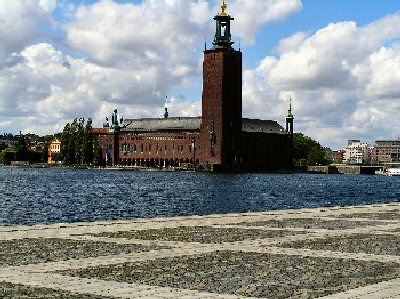
Stockholm town hall from the esplanade
[copyright 2005, Walter Cummins]